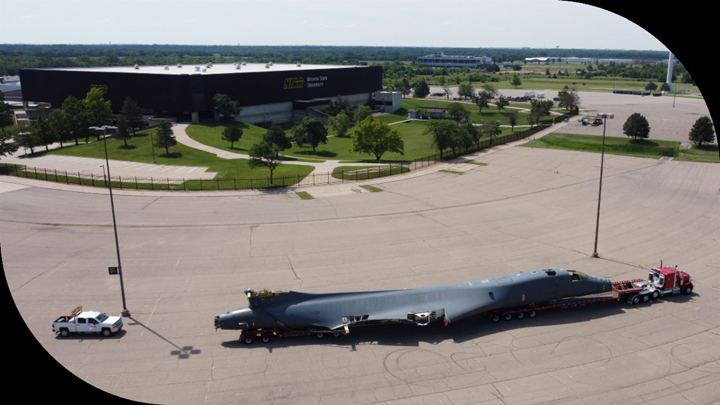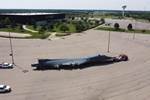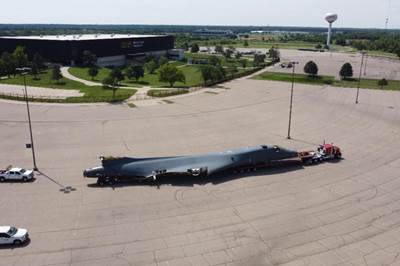Air Force awards $100 million to continue WSU NIAR’s B-1 Digital Engineering program
NIAR’s continued support of adapting the composite warfighter through digital manufacturing will reduce cost, expanding the supply base and increasing aircraft mission readiness.

B-1 warfighter. Photo Credit: WSU-NIAR
On March 9, the B-1 System Program Office (SPO), Tinker AFB, OK awarded a six-year, $100 million follow-on contract to Wichita State University’s National Institute for Aviation Research (NIAR, Wichita, Kan., U.S.) to continue the composites-intensive B-1’s Digital Engineering (DE) transformation. The National Center for Manufacturing Sciences (NCMS, Michigan, U.S.) helped form the strategic partnership and created a flexible contract structure, which enables NIAR and the B-1 SPO to adapt requirements in real time to meet critical warfighter needs.
“This project brings the B-1 into the same field as newly designed aircraft and allows digital modeling to predict future areas of concern. This will allow the SPO to proactively develop repairs, reduce the cost and schedule for parts procurement by eliminating the burden of interpreting legacy Air Force [AF] drawings and increase the number of vendors who are capable of producing parts for the B-1 platform,” says Lt Col Joseph Lay, B-1 SPO material leader for structures. “DE will not only help reduce the time it takes to develop repairs but also to install them. We will be able to develop and test repairs well in advance virtually, ensuring first time success and improving aircraft availability.”
While new AF systems are born digitally, the transition to DE for legacy systems is complicated by various factors to include return on investment (ROI) over the platform’s lifecycle, vendor lock with the original equipment manufacturer (OEM) and understanding where to start on a task of this size and complexity. The B-1 is reportedly proving legacy aircraft can find a benefit and has become a trailblazer for other legacy platforms to follow. Creating flexible requirements with a cost ceiling enables the B-1 to execute only those tasks which provide maximum benefit to the warfighter.
Initially, B-1 chose to focus on structures, one of the main issues impacting fleet availability. With successes in Desert Fox, Allied Force, Iraqi Freedom, Enduring Freedom and Inherent Resolve, the B-1 rapidly flew more hours than anticipated, accelerating the need to extend the original certified test life earlier than expected. While the SPO has made significant progress in the arenas of structural life, maintenance and reliability, DE is said will breathe new life into the fleet, rejuvenating the B-1 to fly until the future bomber force is ready. Even in such short time, the SPO has already begun to benefit from DE activities. B-1 models have been delivered to aid in the design and manufacture of support fixtures for use at depot maintenance facilities and the first set of models are being supplied to third-party vendors to provide digital manufacturing data for complex components.
“NIAR is eagerly looking forward to continuing to support the B-1 SPO’s DE transformation by reducing cost, expanding the supply base and increasing aircraft mission readiness,” says Melinda Laubach-Hock, NIAR B-1 program director. “Over the past two years, the B-1 program team has developed smart ways to implement DE for maximum impact on legacy platforms. Flexibility afforded through the NCMS contract has allowed NIAR to adapt to changing priorities of the warfighter.”
The B-1 SPO began its digital transformation in early 2020, creating a structural digital twin of a single wing. Since then, the effort has expanded to include the structure of the entire airframe, the launch of an Integrated Digital Engineering Environment including a product lifecycle management (PLM) tool, model-based systems engineering (MBSE) efforts to create system modeling language (SySML) representations of various mechanical systems, technical order digitalization, the integration of systems and weapons to enhance the structural digital twin, structural and aerodynamic predictive simulation tool development and other DE efforts.
“Wichita State’s partnership with the DOD [Department of Defense] supports sustainment efforts for legacy weapons systems, like the B-1, that will immediately impact the preparedness of the warfighter,” adds Dr. John Tomblin, senior vice president for industry and defense at WSU. “In addition, these programs provide unique educational opportunities for students to work with seasoned professionals, developing a talent pipeline the DOD is capitalizing on, particularly in the emerging field of digital engineering.”
Related Content
Orbital Composites wins AFWERX award for Starfighter drone fleet
Under the TACFI contract, Orbital is implementing the AMCM process to build 3D printed composite multi-mission UAS aircraft, surpassing $10 million in government awards.
Read MoreIndustrializing additive manufacturing in the defense/aerospace sector
GA-ASI demonstrates a path forward for the use of additive technologies for composite tooling, flight-qualified parts.
Read MoreAirbus presents unmanned Wingman concept
Fighter jet model unveiled at ILA Berlin, made from an iron structure and composite outer skin, will deliver more tactical options, supporting future combat missions.
Read MoreMilliken & Co. partners with MMI Textiles to offer Tegris thermoplastic
The commercial market partnership enables easier access to the Tegris thermoplastic composite fabric for defense customers in the quantities that they require.
Read MoreRead Next
Air Force, WSU-NIAR to study operational impacts on legacy B-1B bomber fuselage
NIAR team will perform a complete teardown and comprehensive inspection program of the B-1B 86-0101 structure to enable the B-1 Division to more comprehensively manage the fleet of aging bombers.
Read MorePlant tour: Daher Shap’in TechCenter and composites production plant, Saint-Aignan-de-Grandlieu, France
Co-located R&D and production advance OOA thermosets, thermoplastics, welding, recycling and digital technologies for faster processing and certification of lighter, more sustainable composites.
Read MoreDeveloping bonded composite repair for ships, offshore units
Bureau Veritas and industry partners issue guidelines and pave the way for certification via StrengthBond Offshore project.
Read More














.jpg;maxWidth=300;quality=90)











